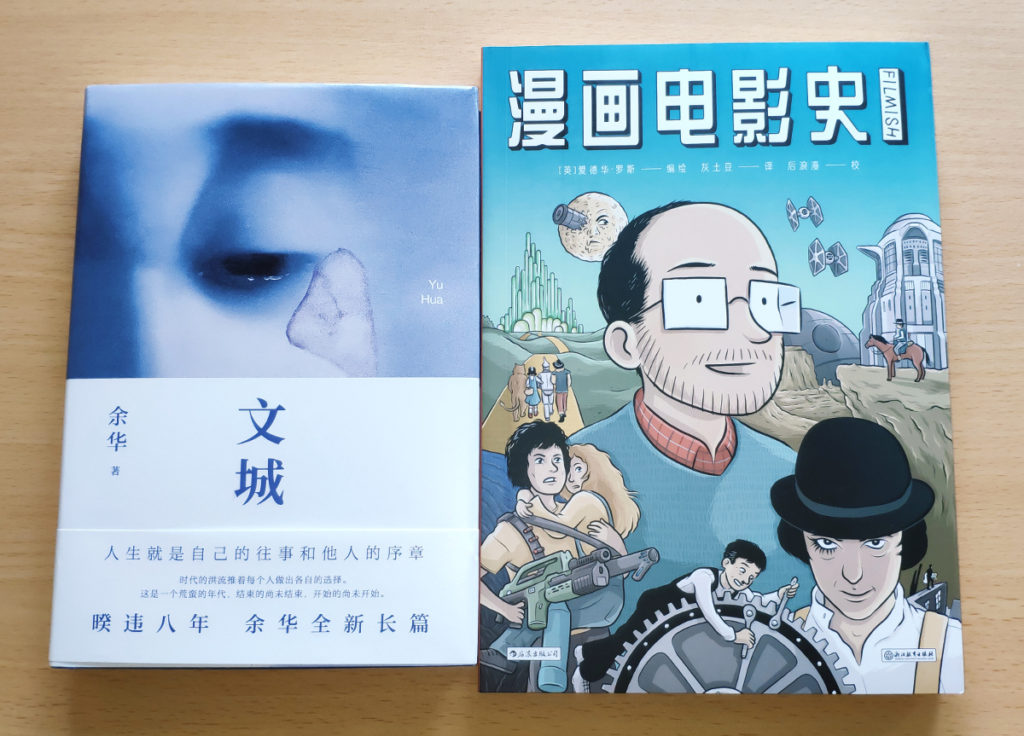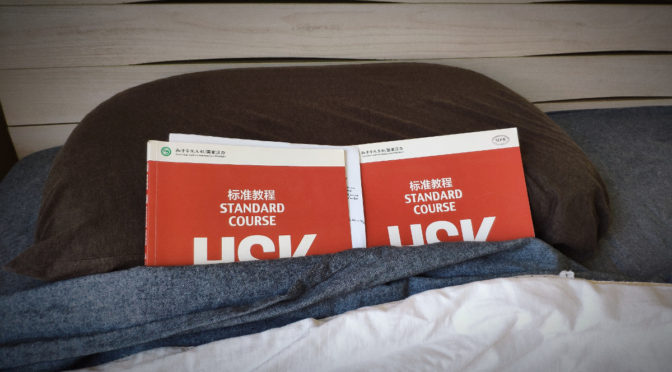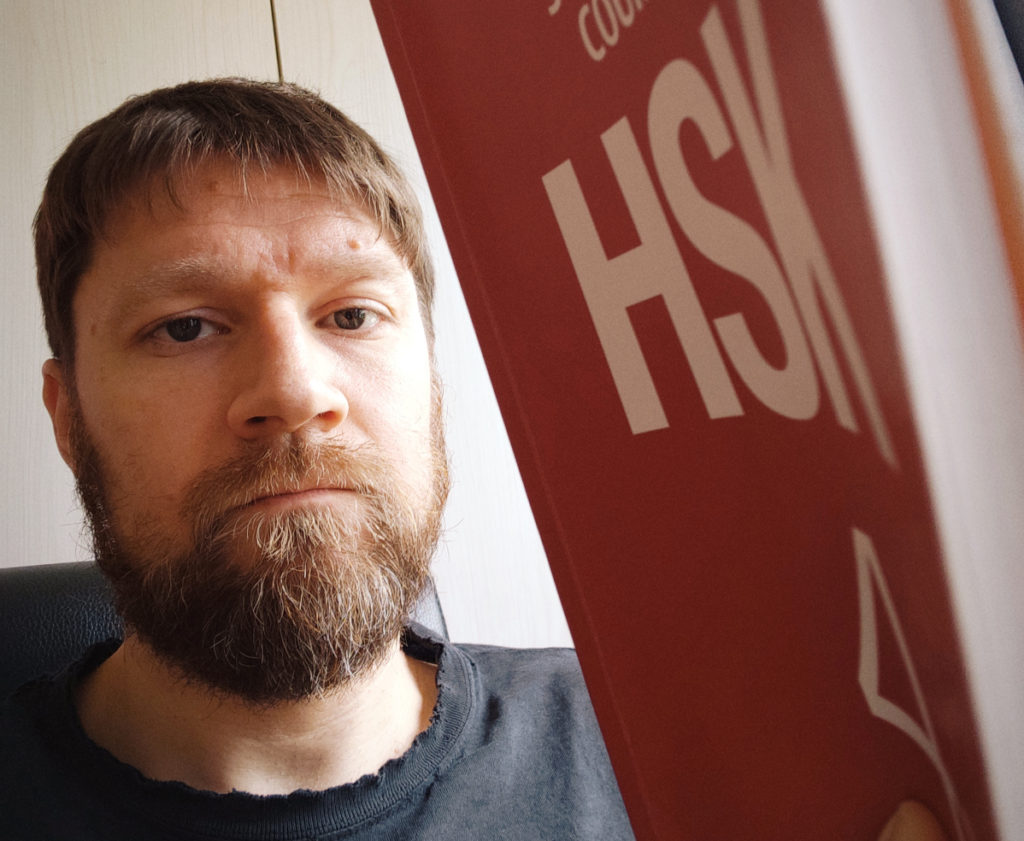I’m sure that if you don’t do something for a while, that’s a sign you’re probably tired of it. So goes my Chinese studies.
Today is May 5th and I’m only ten days away from my HSK 4 test. My teacher and I have been going through the grammar points in my textbooks in preparation for the test and it’s been helpful. I also haven’t received my admission ticket yet (the website says they’ll send it out 5-7 days before the test) but I’m almost hoping that it doesn’t show up so I have an excuse not to go.
But those aren’t the real issues.
The real issue is that, outside of class, I’m hardly working on Chinese any more.
I bought two new books in an effort to spur some sort of motivation and inspiration to study or use the language a bit more, but they’ve already been put away in my bookshelf.

I could go on but the simple fact is that I know I’m undergoing study fatigue. Unlike a structured university semester or language school class, there is no break in my studies. It’s constant “I can’t remember,” “How to say,” “What does this character mean?” and on and on and on. It’s getting a bit defeating.
It’s not impossible but it is difficult. And this is the real tipping point of the HSK levels: by HSK 4 you’re already able to get through a lot of situations on your own without needing to beg someone’s patience or persuade a friend to help. There are still some formal situations it might be better but for most day-to-day things, at HSK 4 you’re able to do a lot of it on your own.
That ability can be off-putting because it’s like you think you know but you don’t actually know. Very sadly, it’s at this point that you become aware of how much more you need to learn. At HSK 4, although your friends will be impressed, most Chinese people will continue to humour your terrible grammar… unless they know English, then they’ll just switch to English make your life (and theirs) much easier.
Besides, there are other things I want to do in life other than sit down with a textbook after work. I’ve been doing exactly that for almost three years and I can tell you this much: that routine is getting boring.
There’s also a bit of dread about starting a new set of textbooks. I’ll even have to say that there is a bit of dread attending class these days, too. Why? Because it reminds me that another week has passed and I’ve barely spent any more time “studying” the language.
Is this languagesplaining? Yes, but I don’t think it’s unwarranted.
At this point and at this level, after all this time I’ve spent on the language, and despite the increase in my abilities and the progress I myself see, to think HSK 5 doubles the number of words I’m supposed to know and adds even more characters to the mix, please forgive me for being a little bit tired.
The question is: How much more is there to go?
The answer is very simple: a lot. You’re only about half way done.
I see other colleagues picking up the burden of studying the language and I do encourage them and often offer some advice or things to watch out for. But in no way, shape or form do I wish I was starting out again. To go through that process again would be painful. I’m not even sure it would be any easier if I had to start again.
One simple test of this type of restart would be to switch from Mandarin to Cantonese (which, on the Mainland, uses the same Simplified Chinese characters but has vastly different pronunciation) or from Simplified characters to Traditional. To think that it’s taken me six years to get to this point, I’m a bit wary of even thinking of learning Traditional Chinese characters.
But then, would I really know Chinese if I couldn’t read Traditional characters? The party dares continue, the disbelieving friend’s voice continues. In other words, “You only learned Simplified Mandarin? So you mean you can’t read that sign over there?” That’s what awaits me after all these years.
Part of this fatigue in learning Mandarin Chinese is what pushed me to pick up Russian again. Whenever I let this slip to others they immediately comment on how difficult Russian is. To be sure, the USA’s Foreign Services Institute puts Russian up there alongside Japanese and Mandarin Chinese at a level 5 difficulty for native English speakers so it’s not like a walk in the park. And already in my Russian studies I’m getting slammed with criticism and constant reminders of how I don’t know the language. At least it feels that way. My vocab is low and my pronunciation is far off, but it is still easier than Chinese.
All that being said, it’s not like I even want to cry, I just kinda want to give up, maybe even go the other direction and completely disregard all of my studies so far and just pretend I actually don’t know any Chinese. I wonder if my life would be easier if only because I wouldn’t have the burden or the psychological weight of feeling like I should be studying something.
Would some time off help? I don’t know. And do what? What do people do with their time? I can say that thanks to this pandemic that this is the longest, continuous amount of time I’ve spent in China and in any one city and country in particular other than in Canada.
Am I just going stir crazy because I can’t leave?
All said, simplify:
- It’s been six and a half years in China and I’ve had two different jobs both within the ESL industry.
- I’ve been focusing on the Chinese language since 2018 mostly in an effort to avoid the break room chatter at work.
- I’m about to write the HSK 4 test which sits somewhere in the middle of the 6-level scale used to identify someone’s Chinese language abilities.
- 1200 words and some 205 “language points” (ie, grammar structures), much of it studied in book format.
- I can’t easily read anything.
- I can barely switch to Chinese on demand (eg, when someone asks me for directions in Chinese, which the delivery guys sometimes do).
- I can fill out most forms since I know the important things to look for, but any discussion about the form would need to be done with a dictionary or a native friend.
- I can’t listen and understand very clearly so, to watch a movie, would require speed reading English subtitles. And I can’t seem to watch any movie more than once. That is to say, there are no “go-to” Chinese movies, TV shows or video clips that I could watch in the same fashion as a Hollywood movie or TV show.
- I can’t say that Chinese music is at all inspiring to listen to enough for either the language points or music itself. I’ve hardly ever listened to music for the words and that hasn’t changed in my language studies… except maybe Russian.
- I’ve had the realization that, in terms of language proficiency, to be able to simply elide letters and words (“what do you want to do” becomes “wa doo u wan na do?”) or using a colloquial part of speech, (“I’m not sure how to put this exactly, but…”) seems a far off and very distant accomplishment.
- Words of encouragement hardly do anything especially when they come from people who aren’t going through the same struggle.
I know that’s a long summary, but those are the thoughts that go through my mind.
It seems as if I’m at an inflection point. Chinese and the culture behind it seem as if they will remain subjects to study, rather to learn for any sort of end. That is to say: everything is a textbook.
As for the people? The people to talk to are usually educated and often know more English than my current Chinese level. This makes it easier for most but it would require extra strain on their behalf to put up with my “bad” Chinese rather than for me to put up with their “bad” English. To be fair, they’ve more than likely immersed themselves more in the English language than I have even if we were the same age.
As for topics? What do people talk about? It will usually about Western pop-culture or how the West and its President are absolutely bonkers. But turn the table and all of a sudden the topics dry up. And therein lies a bit of a problem in learning the Chinese language, there seems to be a bit of a dead end to it.
I know and understand that this is my issue to deal with and to work through. Will I continue to study Chinese? Most likely yes. Maybe I will some TV show like Friends to latch on to but I’m not holding my breath for that to happen. I’ll continue to study mostly because I have time to fill and, most of all, don’t want to be that foreigner who lives in a country yet doesn’t know the language.
It’s a bit disappointing to think that but that’s my current view of the Chinese language, but that’s how things stand heading into my HSK 4 test: I am in need of finding something a bit more to grasp onto than just textbook study.

